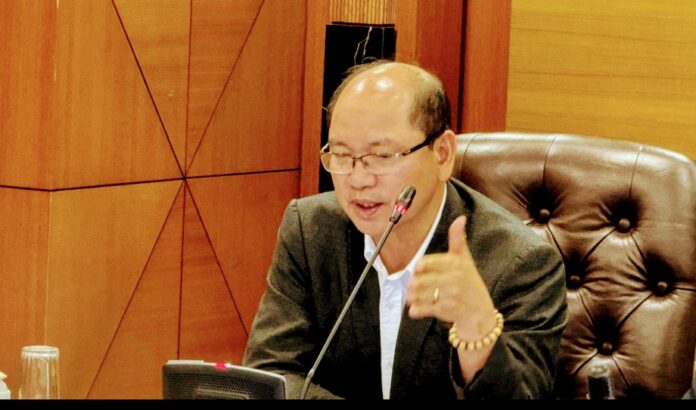Datuk Seri Panglima Wilfred Madius Tangau,
United Progressive Kinabalu Organisation honorary president and Tuaran MP.
“Disproportionate punishments are unjust, and the resulting injustice provokes disobedience of laws.”
Issue extends beyond religious offences, focusing on proportionality of punishment
SOME politicians and opinion leaders try to frame the polemic over the “Allah”-printed socks as one of non-Muslims dictating what should constitute offences to Muslims. This is a red herring, as most of the objections are not to the offence but to the proportionality of punishment.
As a Sabahan with many Muslim friends and relatives, I fully empathise with Muslims’ anger and sadness upon finding the word Allah on the socks. We should all adhere to the wisdom that “to each his own” and respect every religious congregation or cultural community’s right to decide what constitutes offensive acts.
I too feel offended whenever people who are non-Christian and non-Borneo native patronisingly tell us that “all religions prohibit consumption of alcohol”, not knowing the role of wine in holy communion or the centrality of rice wine (tapai, tuak), rice spirit (Montokud, Langkau), and palm wine (Bahar) in native cultures and folk beliefs.
Issue is proportionality, not offence
The crux of the matter in the persisting witch-hunt on KK Supermart is, however, proportionality, a key principle in the rule of law. Disproportionate punishments are unjust, and the resultant injustice provokes disobedience of laws.
Causing a person’s death is a grave crime, but why do we have different punishments for that in the Penal Code? The penalties vary from death or 30-40 years of imprisonment and whipping for murder (Section 302), maximum of 30 years of imprisonment with or without a fine for culpable homicide with intention (Section 304 (a)), a maximum of 10 years of imprisonment, a fine or both for culpable homicide without intention (Section 304(b)) and a maximum two years of imprisonment, a fine or both for “causing death by negligence” (Section 304A).
The key criterion here in determining the severity of punishment is intention, not public wrath. Unintended harms must be punished less than the intended ones. Negligence must not be equated with malice. This is why we have laws and courts to determine facts, including the presence of malice.
Did KK Mart or its supplier, Xin Jian Chang Sdn Bhd, intentionally sell or import the Allah-printed socks? Both KK Mart and Xin Jiang Chang have denied that and apologised immediately. Why is their negligence treated as malice? Why demand or instruct both to close down?
If disproportionality can be justified in the name of religion, then Umno Youth chief Muhamad Akmal Saleh must demand an apology from China for allowing Mu Mian Qing Hosiery Co Ltd in Yiwu, Zhejiang Province, to produce those Allah-printed socks.
Akmal should press Foreign Minister Datuk Seri Mohamad Hasan, also his party’s deputy chair, to summon China’s ambassador for an explanation and to boycott China if Malaysia does not get a satisfactory answer.
In fact, shouldn’t Malaysia speak up for the Muslim world, since, in the foreign minister’s own words, “printing the holy word of ‘Allah’ on socks directly insults Muslims everywhere. It is a desecration of the central belief of more than 1.5 billion people”.
Of course, reasonable Malaysians do not actually expect the foreign minister to act disproportionately against China, which is everywhere in Malaysia’s economy, from the East Coast Rail Line to Forest City, because that would be an economic disaster.
An opportunity to promote inclusion
Why, then, are KK and Xin Jiang Chang being attacked disproportionately?
Why are even denouncements of overreaction slammed on the pretext of defending Islam, subtly implying that such criticisms were made by non-Muslims because they don’t understand Islam? (Exactly opposite to their denial, this line is subtly racialising the issue.)
Sadly, these are done by leaders of government parties, not just Akmal of Umno Youth, Mohd Hasbie Muda of Amanah Youth, and Fahmi Zainol of PKR Youth, and now, even higher up.
Fortunately, we have also heard sober and compassionate voices from within the Muslim community that prevent the issue from being further racialised.
Penang mufti Datuk Seri Wan Salim Wan Mohd Noor, former Wanita Umno chief cum former international trade and industry minister Tan Sri Rafidah Aziz, and Mydin Hypermarket’s Datuk Ameer Ali Mydin have all denounced this witch-hunt.
Datuk Ameer Ali Mydin asked, “Both KK Mart and the vendor have apologised. What else do you expect them to do?”
Most impressively, within Umno, its Johor Youth chief, Noor Azleen Ambro, invites Malaysians to think positively, “if we can accept that it was a genuine and honest mistake”, then the incident opens up an opportunity for mutual understanding.
To counter the bad press and rebuild goodwill, perhaps KK (whose boss Datuk K.K. Chua is a Bornean Malaysian from Sarawak) and Xin Jian Chang can sponsor charity works targeting the Muslims, with the support of Jabatan Kemajuan Islam Malaysia (Jakim) and mufti offices.
To prevent repetition of such incidents, perhaps KK and Xin Jian Chang can review their standard operating procedure to have an equity, diversity and inclusion (EDI) quality control officer to look out for and eliminate offensive products and practices, and a reward mechanism for any staff reporting them.
Perhaps this should be expanded throughout the business sector so that cross-cultural sensitivity is more consciously nurtured through EDI training as part of the environmental, social and governance best practices for Malaysian firms.
Here, the National Human Rights Commission, National Unity Ministry and Jakim can all play a role. In fact, we should promote this to political parties and NGOs which, unlike businesses, often have incentives to offend others to score brownie points.
More than understanding, this can be an opportunity to promote inclusion across the board, in line with the government’s Madani value system.
Adverse impact on Malaysia, ringgit, Madani
I hope Prime Minister Datuk Seri Anwar Ibrahim can see the danger of prolonging the KK witch-hunt and order five ministers in-charge of (a) national unity; (b) Islamic affairs; (c) home affairs; (d) investment, trade and industry; and (e) domestic trade and cost of living to put their heads together to de-escalate and end this crisis.
Let the fire burn, and the collateral damage would be Malaysia, the ringgit, and the Madani government, alongside KK and Xin Jian Chang.
The witch-hunt can bring greater fear of non-Muslims towards Islam, but not more love or respect. This is bad for both Malaysia and Islam. In fact, many Borneo Malaysians increasingly find Malaya a horrifying foreign land.
The witch-hunt will defeat the government’s efforts to bring in foreign investment and stabilise the ringgit. We have been told that the ringgit is undervalued, as our fundamentals are strong and only market confidence is weak.
My foreign friends in the business community are watching the developments with horror. If negligence can lead to a death sentence for a retail chain that is planning to go for IPO, what would protect their investment from rouge competitors or extorting law-enforcers? Would they take the risk of building up a business only to be destroyed or harvested by others? More than losing foreign investments, we may see capital flights from even domestic investors.
Finally, the witch-hunt will hurt the Madani government in GE16, if not earlier. Even with economic growth, a moderate government in Malaysia will have a tough time satisfying various segments of voters.
If the ringgit continues to plummet, and the non-Muslims feel helpless before Muslim vigilantism, one can expect capital flights and low turnout. With the Kota Kubu Baru by-election around the corner, things already look a bit similar to Tanjung Piai.
Geographically speaking, East Malaysia is Mainland Malaysia, which I am going to refer to as the “other Malaysia”.
If the ethno-populism in Malaya is not put under control, notwithstanding the government’s hard work in courting foreign investments, Malaysia will gradually lose the race to Indonesia, Vietnam, and Thailand.
To avoid being dragged to the bottom by Malaya, Sabah and Sarawak should cultivate a clear branding as the other Malaysia, which is geographically identified as Mainland Malaysia, one that is reasonable, stable, inclusive, and at ease with diversity.
We should prepare ourselves to attract both foreign investments coming to Malaysia and domestic investments leaving Malaya. What we lack in infrastructure and human resources, we shall make up with our openness.
While we Borneans and/or Malaysian Mainlanders are not good at producing grand narratives and slogans, we have been the real “Madani” (at least in compassion, respect, and trust) country even before Malaysia was formed. Moderation is our middle name.
I hope Sabah Chief Minister Datuk Seri Hajiji Md Noor and Sarawak Premier Tan Sri Abang Johari Openg can see both the crisis and opportunity we are in. Both states should aggressively enhance EDI and cosmopolitanism at home and set up trade and investment offices overseas.
If Malaya insists on playing with fire, Borneo must grow faster as a safe haven for investments and talents. –Scoop/March 25, 2024.



